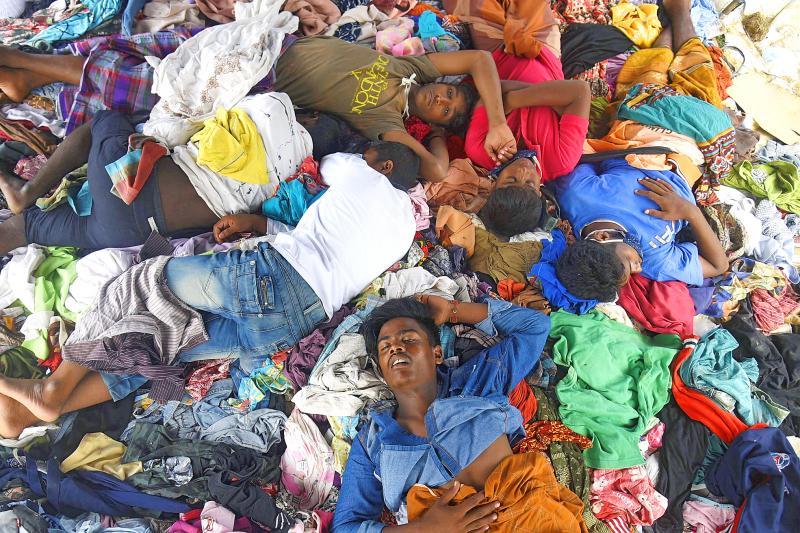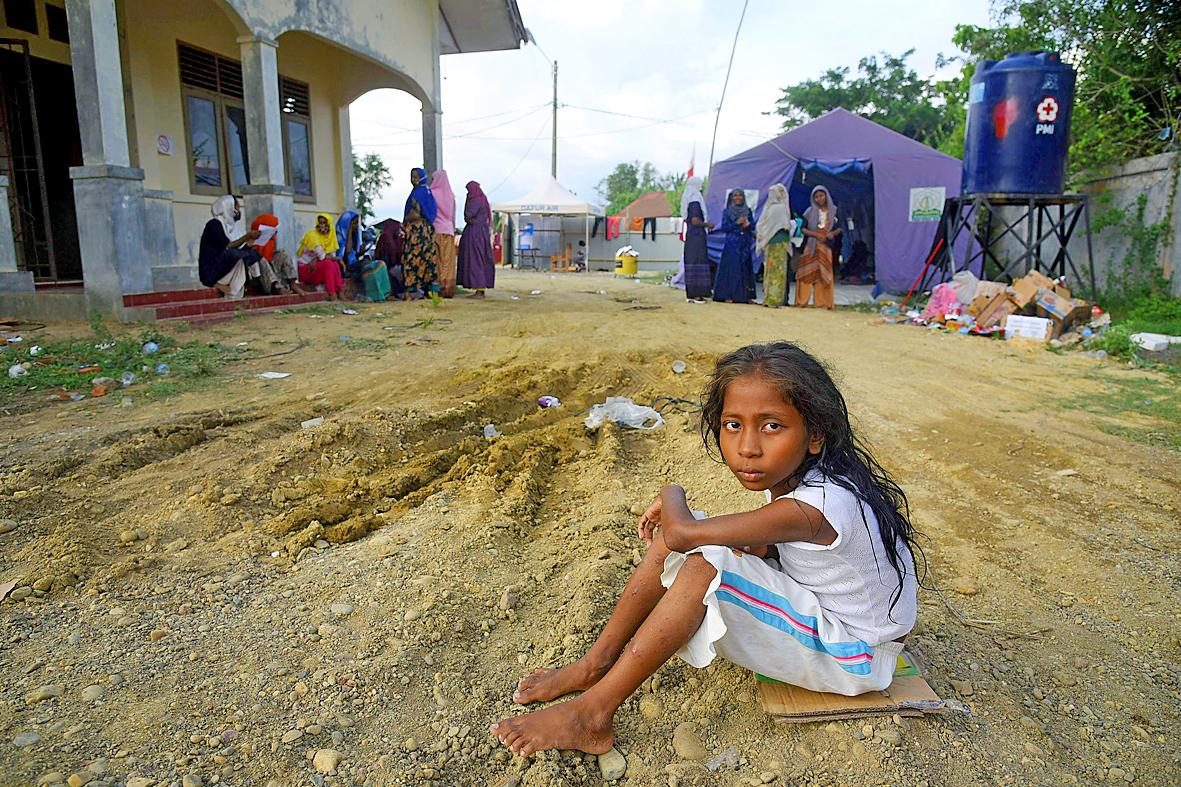When hundreds of Rohingya refugees paid traffickers to escape their squalid camp in Bangladesh, they were promised a new life in Malaysia after just one week at sea.
Instead, the group of mostly women and children suffered more than 200 days of terror on the high seas, until they landed this week on Indonesia’s northern coast, where they are back in refugee tents.
Beaten by the traffickers, they battled hunger and thirst as storms lashed their wooden vessel, and watched in horror as the corpses of scores who died were tossed overboard, survivors said.

Photo: AFP
“We were told that we’d reach Malaysia in seven or eight days, but we floated in the water for months,” one male survivor said from a tent camp on Indonesia’s Sumatra Island. “We suffered miserably. [The crew] tortured us all the time, beating and cutting us.”
Kamrun Nahar, another survivor, said that she lost count of how many bodies were thrown into the sea, adding that “mothers and their children died” after succumbing to illness.
The new accounts — and those of nearly 100 Rohingya who landed in Indonesia in June — suggest that about 800 migrants left Bangladesh on a large boat sometime in March before being split onto smaller vessels.

Photo: AFP
Many paid up to US$2,400 to get aboard, but smugglers held them hostage for months to extort more money from their friends and relatives, survivors and aid agencies said.
SHUTTLE SYSTEM
“Traffickers were said to be demanding transfers of as much as 5,000 ringgit [US$1,204],” the Jakarta-based Institute for Policy Analysis of Conflict (IPAC) said in a report.
Despite their ordeal, the group looked relatively healthy, suggesting that traffickers had an interest in keeping them alive.
Experts have said that some smuggling boats are fitted with desalinization machines to produce potable water during the hazardous crossings, but the latest arrivals said that they were fed little more than a handful of rice and a glass of water each day.
“The smugglers employed a kind of shuttle system, with smaller fishing boats going back and forth with food and water,” the IPAC report said.
In another twist, IPAC said that many women on board were hoping to reach romantic partners in Malaysia.
“Most are already married either virtually or otherwise to men in Malaysia who financed their travel,” it said.
HORRIFIC JOURNEY
Moving refugees from a larger ship onto smaller craft for transfer to shore is a common tactic by traffickers, but it is a perilous operation and an estimated 200 Rohingya have died at sea this year, said Ann Maymann, representative to Indonesia for the UN High Commissioner for Refugees (UNHCR).
“It’s a horrific journey. It’s very unpredictable,” Maymann said. “Those who disembarked are probably those whose families have paid.”
The latest survivor accounts — including claims that there could have been as many as 100 dead — could not be independently verified, but they match reports given to international organizations, including the UNHCR.
Two of this week’s arrivals — a young woman and a man — have died of unspecified illnesses, although everyone had been confirmed negative for COVID-19 after testing by local authorities.
This week’s arrival was one of the biggest such landings by the persecuted Myanmar minority in years.
LONG-TERM PLAN
About 1 million Muslim Rohingya live in refugee camps in Bangladesh, where human traffickers run lucrative operations, promising to find them sanctuary abroad.
Muslim-majority Malaysia and Indonesia are the preferred destinations of Rohingya refugees trying to escape conditions in Bangladesh.
Human rights groups have urged the Indonesian government to negotiate a long-term plan for Rohingya migrants with neighboring countries.
“We suffered a lot in Myanmar and couldn’t find any peace,” said Mahmud Syakir, who fled the refugee camp in the hope of reuniting with his sister in Malaysia.
“I’m a poor guy, an orphan,” he added. “I’ve only got a sister in Malaysia, but I can’t go to her now.”

People with missing teeth might be able to grow new ones, said Japanese dentists, who are testing a pioneering drug they hope will offer an alternative to dentures and implants. Unlike reptiles and fish, which usually replace their fangs on a regular basis, it is widely accepted that humans and most other mammals only grow two sets of teeth. However, hidden underneath our gums are the dormant buds of a third generation, said Katsu Takahashi, head of oral surgery at the Medical Research Institute Kitano Hospital in Osaka, Japan. His team launched clinical trials at Kyoto University Hospital in October, administering an experimental

IVY LEAGUE GRADUATE: Suspect Luigi Nicholas Mangione, whose grandfather was a self-made real-estate developer and philanthropist, had a life of privilege The man charged with murder in the killing of the CEO of UnitedHealthcare made it clear he was not going to make things easy on authorities, shouting unintelligibly and writhing in the grip of sheriff’s deputies as he was led into court and then objecting to being brought to New York to face trial. The displays of resistance on Tuesday were not expected to significantly delay legal proceedings for Luigi Nicholas Mangione, who was charged in last week’s Manhattan killing of Brian Thompson, the leader of the US’ largest medical insurance company. Little new information has come out about motivation,

NOTORIOUS JAIL: Even from a distance, prisoners maimed by torture, weakened by illness and emaciated by hunger, could be distinguished Armed men broke the bolts on the cell and the prisoners crept out: haggard, bewildered and scarcely believing that their years of torment in Syria’s most brutal jail were over. “What has happened?” asked one prisoner after another. “You are free, come out. It is over,” cried the voice of a man filming them on his telephone. “Bashar has gone. We have crushed him.” The dramatic liberation of Saydnaya prison came hours after rebels took the nearby capital, Damascus, having sent former Syrian president Bashar al-Assad fleeing after more than 13 years of civil war. In the video, dozens of

ROYAL TARGET: After Prince Andrew lost much of his income due to his friendship with Jeffrey Epstein, he became vulnerable to foreign agents, an author said British lawmakers failed to act on advice to tighten security laws that could have prevented an alleged Chinese spy from targeting Britain’s Prince Andrew, a former attorney general has said. Dominic Grieve, a former lawmaker who chaired the British Parliament’s Intelligence and Security Committee (ISC) until 2019, said ministers were advised five years ago to introduce laws to criminalize foreign agents, but failed to do so. Similar laws exist in the US and Australia. “We remain without an important weapon in our armory,” Grieve said. “We asked for [this law] in the context of the Russia inquiry report” — which accused the government